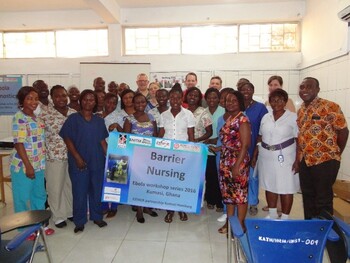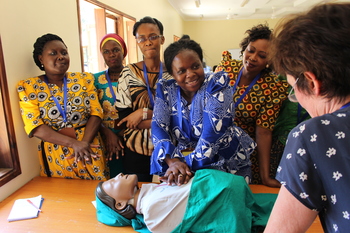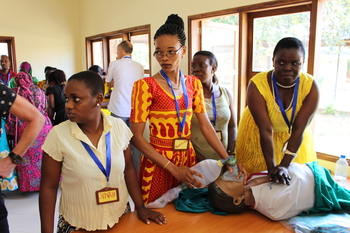Institutional university and hospital partnerships strengthen health care facilities
Project description
Title: Regional projects Institutional health partnerships in Africa
Commissioned by: German Federal Ministry for Economic Cooperation and Development (BMZ)
Country: Africa region
Overall term: 2016 to 2019

Context
Health care systems in western countries are increasingly adapting to adopt active error management strategies. In contrast, measures to ensure patient safety are often inadequate in African countries with weak health care systems. Medical expertise, modern technologies and effective approaches to optimise processes are therefore in high demand among specialist health workers in many African countries.
Against this backdrop, German universities and hospitals are valuable partners. The regional University and Hospital Partnerships programme in Africa is providing approximately EUR 150,000 in funding for partnership projects on patient safety and has a term of two years.
The partnership projects are developed on request by the partner countries and are designed by medical specialists from African countries and Germany working in close cooperation.
The university and hospital partnerships are part of the international ESTHER Alliance for Global Health Partnerships: a network of governments and organisations that commit institutionally to foster effective and sustainable North-South partnerships. The ESTHER Alliance’s quality standards are implemented in the project.
Objective
The institutional university and hospital partnerships improve patient safety in selected African countries.

Approach
The current partnership projects on patient safety focus on scientifically sound and practical approaches. The projects benefit from the professional expertise and experience gathered by German and African experts from health care institutions. Together, health professionals develop country-specific solutions for urgent challenges regarding care quality and implement them using knowledge exchange, temporary placements and training. The programme's target groups are primarily universities, university hospitals, teaching hospitals and research institutes. The challenges they face include infection risks, resistance to antibiotics, lacking hygiene, ensuring precise drug therapies, laboratory safety and waste management.

Results
The programme was effective: 15 university and hospital partnerships improved patient safety in the participating countries. The partnership projects performed detailed needs analyses in the countries, identified deficiencies in preventing and controlling infections, hygiene or diagnostics and remedied them. In order to achieve this, the programme conducted training courses and developed standardised procedures that were integrated into hospital procedures. Some partnerships produced disinfectants and encouraged staff to use them regulary.
The Antimicrobial Resistance Network (AMR) provided the best example of networking among the partnerships. Five university and hospital partnerships projects joined forces to work on the topic and received additional funding from the German Federal Ministry of Education and Research. This enabled them to successfully apply to the new University and Hospital Partnerships programme in Africa on the topic of eHealth. The AMR network also shared information with the secretariat of the East African Community (EAC) on the topic of one-health in order to meet the regional challenge of antimicrobial resistance.